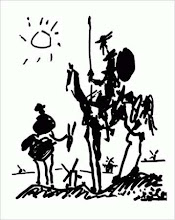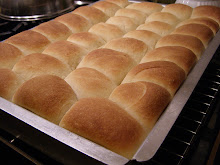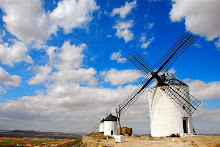Today's moment of sublime quixotica was submitted by a Mr. John Krauss. Mr. Krauss hails from historic Cheverly, MD and grew up on the mean streets of Prince George's County. In his spare time, John enjoys long walks on the beach, gangster rap, writing haikus about Star Trek and keeping it real.
He has been known to wear the occasional cloak, uses the phrase "BTW" religiously in everyday human-to-human conversation and claims some distant relation to bluegrass vixen (and hottie) Allison Krauss. An active gamer, John (or "Icey J" as his friends call him) maintains a challenging second life on Second Life, where he goes by the name of Grease Coakes.
Check him out at grease711@yahoo.com , he's sui generis (that's a real word actually)
biscuits and gravy
[bĭs'kĭtz and grey-vee]
n., an exclamation indicative of a state of quiet contentment, usually as a result of some fortuitous and unexpected turn of events; usually preceded in everyday speech by the "it's all ..." sentence fragment; for the purpose of brevity during conversation, the "it's all" component can also be eliminated while still retaining the same meaning
Synonyms include "it's all good," "all fruits ripe," and "sweet"
I guess there's just something special about the harmony that exists between a small cake of shortened bread leavened with baking powder or soda and the fat and juices that drip from cooking meat, often thickened, seasoned, flavored, etc., and used as a sauce
"But you were supposed to pick me up an hour ago at the Farragut West Metro. At first, I was kinda mad, but then I started talking to this chick who likes to play World of Warcraft. We exchanged screen names and I'm going to call her next week, ... so it's all biscuits and gravy."
Did You Know?:The phrase "it's all good" has a downright fascinating history, traced here with vim and verve by author Rebecca Mead in a 2001 magazine article. And be sure to check out Rebecca's other original work, especially her razor-sharp take on the business of weddings in One Perfect Day, available at Amazon.com. The New York Times thinks she's the cat's meow. Or is it the ant's pants
Excerpted from RebeccaMead.Com
... This is, of course, arguable, but the adoption of "It's all good" does confirm that phrase's omnipresence in the contemporary lexicon. The expression got a big push into the mainstream this spring on "Survivor: The Australian Outback," when it was used by Alicia Calaway, the buff personal trainer, who informed twenty-eight and a half million Americans that, even though she had not won a million dollars, her experience had indeed been all good. And when Puffy Combs was asked by "Entertainment Tonight" about his painful breakup with Jennifer Lopez earlier this year, he resorted to the "It's all good" formula to explain how he would always have a place in his heart for J. Lo.
According to Weinstock, the meaning of "It's all good" is straightforward. "It means 'no worries,' " he said. "If Disney were to use it, they would say 'Hakuna Matata.' " Actually, "It's all good" is often more nuanced. The original popularizers of the expression were rap performers, including Hammer, who in 1994 released a song entitled "It's All Good." A year later, Tupac Shakur employed the phrase in his hit "California Love," on which Dr. Dre announced, "Diamonds shinin' lookin' like I robbed Liberace / It's all good from Diego to tha Bay." In such contexts, "It's all good" serves as a statement of defiance rather than complacency; things are clearly not all good, for example, if you happen to be Liberace.
The phrase continues to be reflexively used in the rap world, and it has now been adopted ironically by upper-middle-class white people, in whose parlance "It's all good" is usually a way of preëmptively closing a conversation--a discussion of the final episode of "The Sopranos," for example--and segueing to the next topic: where to find the best sushi in the East Village.
But the most widespread use of "It's all good" seems to be among people who have recently discovered yoga and meditation. For this demographic, "It's all good" has become a kind of New Age, neo-Buddhist mantra, one with a peculiarly American flavor of optimism. (As Mark Epstein, the author of "Going On Being: Buddhism and the Way of Change," points out, a truly Buddhist view would be "It's all suffering.") It means that every reversal--breaking up with your boyfriend, getting downsized from your dot-com--is also an opportunity for personal growth. Admittedly, this usage has greater appeal if you are a laid-off, newly single dot-commer than it might if you were, say, an Afghani refugee or a resident of southern Sudan.
Stephen Cope, the author of "Yoga and the Quest for the True Self," explained by telephone last week that he often hears the phrase in the halls of the Kripalu Center for Yoga & Health in Lenox, Massachusetts, where he is the senior scholar-in-residence. Cope said that although he believes Americans often need a corrective to an embedded Puritan world view--which might be characterized as "It's all bad, especially you"--the phrase does, nonetheless, raise his hackles.
"There is a way in which that mantra can lead to a fatalistic view of life, and can leave out the incredible power of choice," he said. The first time Cope heard the expression was shortly after he arrived at Kripalu, twelve years ago.
"My car had broken down in the middle of a nor'easter, and I ended up having to walk home through the storm and got pneumonia," he said. "I remember someone proposed to me the notion that this was all good, and I definitely had a reaction to it: it is not good being sick, and it would have been good if I had had a cell phone. The only thing that is definitely all good all the time is anything that comes in a blue box from Tiffany."








1 comment:
Hahahaha I love it!
Post a Comment